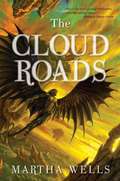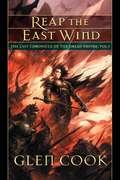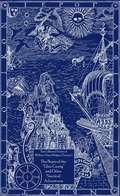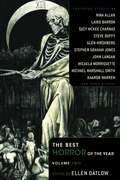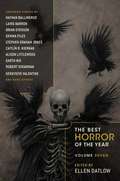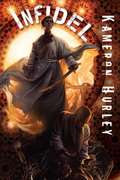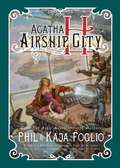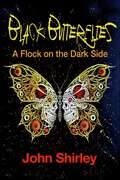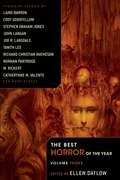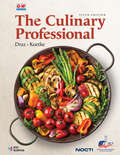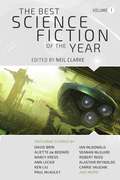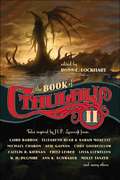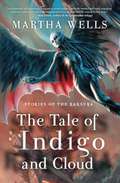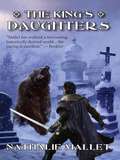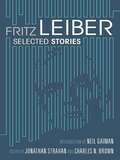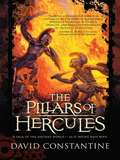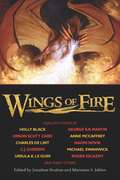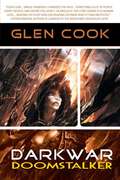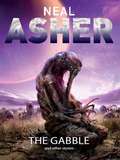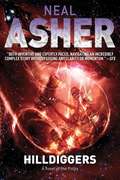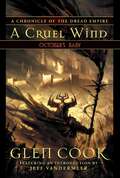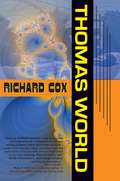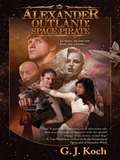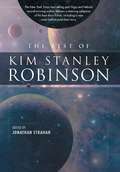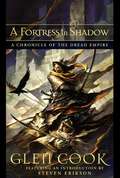- Table View
- List View
The Cloud Roads (The Books of the Raksura)
by Martha WellsMoon has spent his life hiding what he is — a shape-shifter able to transform himself into a winged creature of flight. An orphan with only vague memories of his own kind, Moon tries to fit in among the tribes of his river valley, with mixed success. Just as Moon is once again cast out by his adopted tribe, he discovers a shape-shifter like himself... someone who seems to know exactly what he is, who promises that Moon will be welcomed into his community. What this stranger doesn't tell Moon is that his presence will tip the balance of power... that his extraordinary lineage is crucial to the colony's survival... and that his people face extinction at the hands of the dreaded Fell! Now Moon must overcome a lifetime of conditioning in order to save and himself... and his newfound kin.
Reap the East Wind
by Glen CookIt has ended. It begins again. In Kavelin, Lady Nepanthe's new life with the wizard Varthlokkur is disturbed by visions of her lost son, while King Bragi Ragnarson and Michael Trebilcock scheme to help the exiled Princess Mist re-usurp her throne — under their thumb. In Shinsan, a pig-farmer's son takes command of Eastern Army, while Lord Kuo faces plots in his council and a suicide attack of two million Matayangans on his border. But in the desert beyond the Dread Empire, a young victim of the Great War becomes the Deliverer of an eons-forgotten god, chosen to lead the legions of the dead. And the power of his vengeance will make a world's schemes as petty as dust, blown wild in the horror that rides the east wind.This volume marks the beginning of the end. Reap the East Wind is the first step on the road to the long-delayed final chapter of Glen Cook's legendary Dread Empire series.
The Collected Fiction of William Hope Hodgson: Boats of Glen Carrig & Other Nautical Adventures
by William Hope HodgsonThe first of a five volume set collecting all of Hodgson's published fiction. Each volume contains one of Hodgson's novels, along with a selection of thematically-linked short fiction.
The Best Horror of the Year Volume 2 (Best Horror of the Year)
by edited by Ellen DatlowCelebrities take refuge in a white-walled mansion as plague and fever sweep into Cannes; a killer finds that the living dead have no appetite for him; a television presenter stumbles upon the chilling connection between a forgotten animal act and the Whitechapel Murders; a nude man unexpectedly appears in the backgrounds of film after film; mysterious lights menace the crew of a small plane; a little girl awakens to discover her nightlight--and more--missing; two sisters hunt vampire dogs in the wild hills of Fiji; lovers get more than they bargained for in a decadent discotheque; a college professor holds a classroom mesmerized as he vivisects Poe's "The Masque of the Red Death"...What frightens us, what unnerves us? What causes that delicious shiver of fear to travel the lengths of our spines? It seems the answer changes every year. Every year the bar is raised; the screw is tightened. Ellen Datlow knows what scares us; the seventeen stories included in this anthology were chosen from magazines, webzines, anthologies, literary journals, and single author collections to represent the best horror of the year.Legendary editor Ellen Datlow (Poe: New Tales Inspired by Edgar Allan Poe), winner of multiple Hugo, Bram Stoker, and World Fantasy awards, joins Night Shade Books in presenting The Best Horror of the Year, Volume Two.
Best Horror of the Year (Best Horror of the Year)
by Ellen DatlowFor over three decades, Ellen Datlow has been at the center of horror. Bringing you the most frightening and terrifying stories, Datlow always has her finger on the pulse of what horror readers crave. Now, with the seventh volume of this series, Datlow is back again to bring you the stories that will keep you up at night.Encompassed in the pages of The Best Horror of the Year have been such illustrious writers as:Neil GaimanKim RobinsonStephen KingLinda NagataLaird BarronMargo LanaganAnd many othersWith each passing year, science, technology, and the march of time shine light into the craggy corners of the universe, making the fears of an earlier generation seem quaint. But this &“light&” creates its own shadows. The Best Horror of the Year chronicles these shifting shadows. It is a catalog of terror, fear, and unpleasantness, as articulated by today&’s most challenging and exciting writers.
Infidel (Bel Dame Apocrypha)
by Kameron HurleyNyx is a bodyguard in Mustallah, the capital city of Nasheen. The centuries-long holy war between Nasheen and Chenja is taking its toll, with shortages and rationing causing the Queen to lose power and popularity. While protecting the daughter of a Ras Tiegan Diplomat, Nyx is attacked by a group of assassins. Nyx survives, but begins to suffer from a strange, debilitating condition that nobody can identify. Caught up in a whirl-wind of intrigue involving Bel Dam Assassins plotting against the Queen, Nyx must learn who the rouge Bel Dam is, and find a cure for her illness, while avoiding the wrath of the queen she is trying to protect. The danger that swirls around her may have finally become to much, and Nyx's colleagues and friends began to die. Will Nyx be next?
Agatha H. and the Airship City (Girl Genius)
by Phil Foglio Kaja FoglioThe Industrial Revolution has escalated into all-out warfare. It has been eighteen years since the Heterodyne Boys, benevolent adventurers and inventors, disappeared under mysterious circumstances. Today, Europe is ruled by the Sparks, dynasties of mad scientists ruling over — and terrorizing — the hapless population with their bizarre inventions and unchecked power, while the downtrodden dream of the Hetrodynes' return.At Transylvania Polygnostic University, a pretty, young student named Agatha Clay seems to have nothing but bad luck. Incapable of building anything that actually works, but dedicated to her studies, Agatha seems destined for a lackluster career as a minor lab assistant. But when the University is overthrown by the ruthless tyrant Baron Klaus Wulfenbach, Agatha finds herself a prisoner aboard his massive airship Castle Wulfenbach — and it begins to look like she might carry a spark of Mad Science after all.
Black Butterflies
by John ShirleyThis collection of gritty and intense short stories compares the horrors of the real world to those of the supernatural. Winner of the Bram Stoker Award, the International Horror Guild Award, and a Publishers Weekly Best Book of the Year.
The Best Horror of the Year (Best Horror of the Year)
by Ellen DatlowA doctor makes a late-night emergency call to an exclusive California riding school; a professor inherits a mysterious vase... and a strange little man; a struggling youth discovers canine horrors lurking beneath the streets of Albany; a sheriff ruthlessly deals with monstrosities plaguing his rural town; a pair of animal researchers makes a frightening discovery at a remote site; a sweet little girl entertains herself... by torturing faeries; a group of horror aficionados attempts to track down an unfinished film by a reclusive cult director; a man spends a chill night standing watch over his uncle's body; a girl looks to understand her place in a world in which zombies have overrun the earth; a murderous pack of nuns stalks a pair of Halloween revelers...What frightens us, what unnerves us? What causes that delicious shiver of fear to travel the lengths of our spines? It seems the answer changes every year. Every year the bar is raised; the screw is tightened. Ellen Datlow knows what scares us; the seventeen stories included in this anthology were chosen from magazines, webzines, anthologies, literary journals, and single author collections to represent the best horror of the year.Legendary editor Ellen Datlow (Lovecraft Unbound, Tails of Wonder and Imagination), winner of multiple Hugo, Bram Stoker, and World Fantasy awards, joins Night Shade Books in presenting The Best Horror of the Year, Volume Three.
The Culinary Professional
by Christopher Koetke John DrazThe Culinary Professional is a richly illustrated, comprehensive, culinary arts program written with an approachable writing style and design. Hundreds of photos of professional tools and ingredients plus step-by-step directions for basic culinary skills and cooking methods make this textbook a must-have for learning how to safely prepare delicious dishes. This title also includes cross-curricular activities in reading, writing, science, technology, math, nutrition, and sustainability, along with guidance for students on building a professional e-portfolio to help launch a successful career. When paired with the student workbook and hands-on activities in the student lab manual, important learning outcomes focused on critical thinking, culinary skills, problem solving, collaboration, and communication can be practiced and successfully mastered. Experienced authors, educators, and chefs John Draz and Christopher Koetke focus on what to expect when entering the culinary arts industry, from workplace ethics to working in teams to developing tasting skills for quality control. The fifth edition is structured into sections of text followed by review questions within targeted lessons to reinforce student mastery of new skills and knowledge.
The Best Science Fiction of the Year (Best Science Fiction of the Year)
by Neil ClarkeTo keep up-to-date with the most buzzworthy and cutting-edge science fiction requires sifting through countless magazines, e-zines, websites, blogs, original anthologies, single-author collections, and more—a task accomplishable by only the most determined and voracious readers. For everyone else, Night Shade Books is proud to introduce the inaugural volume of The Best Science Fiction of the Year, a new yearly anthology compiled by Hugo and World Fantasy award–winning editor Neil Clarke, collecting the finest that the genre has to offer, from the biggest names in the field to the most exciting new writers.The best science fiction scrutinizes our culture and politics, examines the limits of the human condition, and zooms across galaxies at faster-than-light speeds, moving from the very near future to the far-flung worlds of tomorrow in the space of a single sentence. Clarke, publisher and editor in chief of the acclaimed and award-winning magazine Clarkesworld, has selected the short science fiction (and only science fiction) best representing the previous year&’s writing, showcasing the talent, variety, and awesome &“sensawunda&” that the genre has to offer.Neil Clarke is the award-winning publisher and editor in chief of Clarkesworld magazine, winner of three Hugo Awards for Best Semiprozine, and the editor of the 2014 cyborg-themed original anthology Upgraded. Clarke lives in Stirling, New Jersey.
The Book of Cthulhu 2
by Ross LockhartLast year, Night Shade Books unleashed The Book of Cthulhu onto an unsuspecting world. Critically acclaimed as &“the ultimate Cthulhu anthology&” and &“a &‘must read&’ for fans of Lovecraft&’s Cthulhu mythos,&” The Book of Cthulhu went where no collection of mythos tales had gone before: to the very edge of madness… and beyond.For nearly a century, H. P. Lovecraft&’s tales of malevolent Great Old Ones existing beyond the dimensions of this world, beyond the borders of sanity, have captured and held the imaginations of writers and aficionados of the dark, the macabre, the fantastic, and the horrible. Now, because you demanded more, anthologist Ross E. Lockhart has risked all to dive back into the Cthulhu canon, combing through mind-shattering manuscripts and moldering tomes to bring you The Book of Cthulhu 2, with even more tales of tentacles, terror, and madness.Featuring monstrous stories by many of weird fiction&’s brightest lights, The Book of Cthulhu 2 brings you even more tales inspired by H. P. Lovecraft&’s greatest creation: The Cthulhu mythos.This year, the stars are right…Iä! Iä! Cthulhu Fhtagn!
Stories of the Raksura: The Tale of Indigo and Cloud
by Martha Wells&“The Tale of Indigo and Cloud&” explores the history of the Indigo Cloud Court, long before Moon was born. In the distant past, Indigo stole Cloud from Emerald Twilight. But in doing so, the reigning Queen Cerise and Indigo are now poised for a conflict that could spark war throughout all the courts of the Reaches.
The King's Daughters
by Nathalie MalletFar to the north of the hot desert land of Telfar lies the frozen kingdom of Sorvinka. Prince Amir has traveled there, leaving his sultanate in the hands of his half-brother Erik as he seeks to ask the king, the father of the beautiful Princess Eva, for her hand in marriage. But Sorvinka has grown dangerous during Princess Eva's absence, as she and Amir discover to their terror, when their force of guards and eunuchs is cut down by ruthless brigands. And upon their arrival, their welcome to Eva's family stronghold is as bitterly cold as the land itself. Accustomed to the golden cage of his upbringing, Prince Amir must navigate his way through the strange and cold-blooded customs of the Sorvinkans, and somehow find the truth behind the kidnapping of the king&’s youngest daughter, the Princess Aurora, by the Sorvinkan&’s traditional enemies, the neighboring Farrellians. But what can a stranger in a foreign land do?
Fritz Leiber: Selected Stories
by Fritz LeiberFritz Leiber's work bridges the gap between the pulp era of H. P. Lovecraft and the paperback era of P. K. Dick, and arguably is as influential as both these authors. From a historical context, Leiber, in fact, knew both of the authors, and his work can be seen as a bridge connecting the many different flavors of genres of science fiction, fantasy, and horror. Edited by award-winning editors Jonathan Strahan and Charles Brown, this new collection of the grand master's fiction covers all facets of his work, and features an Introduction by Neil Gaiman and an Afterword by Michael Chabon.
The Pillars of Hercules
by David ConstantineAlexander, Prince of Macedon, is the terror of the world. Persia, Egypt, Athens… one after another, mighty nations are falling before the fearsome conqueror. Some say Alexander is actually the son of Zeus, king of the gods, and the living incarnation of Hercules himself. Worse yet, some say Alexander believes this…The ambitious prince is aided in his conquest by unstoppable war-machines based on the forbidden knowledge of his former tutor, the legendary scientist-mage known as Aristotle. Greek fire, mechanical golems, and gigantic siege-engines lay waste to Alexander's enemies as his armies march relentlessly west—toward the very edge of the world.Beyond the Pillars of Hercules, past the gateway to the outer ocean, lies the rumored remnants of Atlantis: ancient artifacts of such tremendous power that they may be all that stands between Alexander and conquest of the entire world. Alexander desires that power for himself, but an unlikely band of fugitives—including a Gaulish barbarian, a cynical Greek archer, a cunning Persian princess, and a sorcerer's daughter—must find it first… before Alexander unleashes godlike forces that will shatter civilization.The Pillars of Hercules is an epic adventure that captures the grandeur and mystery of the ancient world as it might have been, where science and magic are one and the same.
Wings of Fire
by Jonathan Strahan Marianne S. JablonDragons: Fearsome fire-breathing foes, scaled adversaries, legendary lizards, ancient hoarders of priceless treasures, serpentine sages with the ages' wisdom, and winged weapons of war... Wings of Fire brings you all these dragons, and more, seen clearly through the eyes of many of today's most popular authors, including Peter Beagle, Holly Black, Orson Scott Card, Charles De Lint, Diana Wynne Jones, Mercedes Lackey, Ursula K Le Guin, Dean R Koontz, George R. R. Martin, Anne McCaffrey, Elizabeth Moon, Garth Nix, and many others.
Doomstalker: Book One of The Darkwar Trilogy
by Glen CookThe world grows colder with each passing year, the longer winters and ever-deepening snows awaking ancient fears within the Dengan Packstead, fears of invasion by armed and desperate nomads, attack by the witchlike and mysterious Silth, able to kill with their minds alone, and of the Grauken, that desperate time when intellect gives way to buried cannibalistic instinct, when meth feeds upon meth. For Marika, a young pup of the Packstead, loyal to pack and family, times are dark indeed, for against these foes, the Packstead cannot prevail. But awakening within Marika is a power unmatched in all the world, a legendary power that may not just save her world, but allow her to grasp the stars themselves. From Glen Cook, author of the Black Company and Dread Empire novels. The first book in the Darkwar series.
The Gabble and Other Stories
by Neal AsherIn the eight years since his first full-length novel Gridlinked was published by Pan Macmillan, Neal Asher has firmly established himself as one of the leading British writers of Science Fiction, and his novels are now translated in many languages. Most of his stories are set in a galactic future-scape called &‘The Polity&’, and with this collection of marvellously inventive and action-packed short stories, he takes us further into the manifold diversities of that amazing universe. No one does monsters better than Neal Asher, so be prepared to revisit the lives and lifestyles of such favourites as the gabbleduck and the hooder, to savour alien poisons, the walking dead, the Sea of Death, and the putrefactor symbiont.
Hilldiggers (A Novel of Polity)
by Neal AsherDuring a war between two planets in the same solar system – each occupied by adapted humans – what is thought to be a cosmic superstring is discovered. After being cut, this object collapses into four cylindrical pieces, each about the size of a tube train. Each is densely packed with either alien technology or some kind of life. They are placed for safety in three ozark cylinders of a massively secure space station. There a female research scientist subsequently falls pregnant, and gives birth to quads. Then she commits suicide – but why? By the end of the war one of the contesting planets has been devastated by the hilldiggers – giant space dreadnoughts employing weapons capable of creating mountain ranges. The quads have meanwhile grown up and are assuming positions of power in the post-war society. One of them will eventually gain control of the awesome hilldiggers . . .
October's Baby: Book Two of A Cruel Wind
by Glen CookBefore there was Black Company, there was the Dread Empire, an omnibus collection the first three Dread Empire novels: A Shadow of All Night's Falling, October's Baby and All Darkness Met. For the first time in eBook format, the A Cruel Wind collection is available as individual books.
Thomas World
by Richard CoxThomas Phillips knows he's losing his mind. He's been losing it for as long as he can remember. And yet, when a strange old man asks him to consider that he, out of everyone in the world, knows the real truth, Thomas' life begins to spiral out of control. He loses interest in his job and is fired. He refuses his wife's suggestion of psychiatric care, and she leaves him. In the end, Thomas is alone. Except he's not, because someone seems to be following him. What if you were Thomas? Where would you go? What would you do? What if you realized every person in your life had been scripted to be there? What if you were haunted by the idea that you'd lived all these encounters before, hundreds or even thousands of times before? And what if the person watching all this time was you?Thomas World explores what happens when the borders of reality start seeming a bit pores... when things start bleeding through the edges, challenging ones perceptions of the universe. The grand tradition of Dickian, New Wave SF is explored by Richard Cox in this 21st century thriller!
Alexander Outland
by G.J. KochCaptain Alexander Outland of the Sixty-Nine (short for Space Vessel 369, of course) is the best pilot in the galaxy. He&’s also a pirate, a smuggler, and loved and loathed by women in umpteen solar systems. His crew of strays and misfits includes an engineer of dubious sanity, a deposed planetary governor, an annoyingly unflappable Sexbot copilot, and a slinky weapons chief who stubbornly refuses to give the captain a tumble.Outland just wants to make a decent living skirting the law, but when an invisible space armada starts cutting into his business, he soon finds himself in hot water with the military, the mob, mad bombers, and an extended family of would-be conquerors. And that&’s not counting an occasionally telepathic spy . . . .Like any sensible scoundrel, he hates heroics. They&’re risky and they don&’t pay well. But to keep his ship and crew in one piece, and make time with a certain hard-to-get weapons chief, he might just have to make an exception–and save the galaxy in spite of himself!
The Best of Kim Stanley Robinson
by Kim Stanley RobinsonKim Stanley Robinson has been an ongoing force in the Science Fiction genre for over twenty years, with his novels (Year&’s of Rice and Salt, Forty Signs of Rain) crossing over to the mainstream, and routinely appearing on the New York Times best sellers list. During the 80s and early nineties, his short fiction continued to push the boundaries of science fiction, defining the science-focused side of the science fiction genre.Award-winning editor Jonathan Strahan worked with Kim Stanley Robinson to select the stories that make up this landmark volume. In addition to these reprints, The Best of Kim Stanley Robinson features a brand-new short story, "The Timpanist of the Berlin Philharmonic, 1942."
A Fortress In Shadow
by Glen CookOnce a mighty kingdom reigned, but now all is chaos. In the vast reaches of the desert, a young heretic escapes certain death and embarks on a mission of madness and glory. He is El Murid—the Disciple—who vows to bring order, prosperity and righteousness to the desert people of Hammad al Nakir. El Murid incites rebellion against the godless kingdoms and tribes as he plots to execute the justice of the desert. After four long centuries, El Murid is the savior who is destined to build a new empire from the blood his enemies. Or so it seems. El Murid has victory in his grasp, the desert tribes of Hammad al Nakir are rallying around him, and the last remaining thread of the royal lineage wanders the desert with only Heathens to help him. But all is not as it seems, and the sinister forces pulling the strings of empire come into the light. Who and what lies behind El Murid&’s vision of a desert empire?
